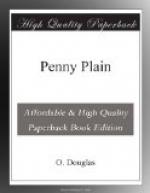She kissed Jean affectionately, upbraiding her for being long in coming, and turned eagerly to Pamela. New people still interested her vividly. Here was a newcomer who promised well.
“Ah, my dear,” she said in greeting, “I have wanted to know you. I’m told you are the most interesting person who ever came to this little town.”
Pamela laughed. “There I am sure you have been misled. Priorsford is full of exciting people. I expected to be dull, and I have rarely been so well amused.”
Mrs. Hope studied the charming face bent to her own. Her blue eyes were shrewd, and though she stood so near the end of the way she had lost none of her interest in the comings and goings of Vanity Fair.
“Is Priorsford amusing?” she said. “Well” (complacently), “we have our points. As Jane Austen wrote of the Misses Bingley, ’Our powers of conversation are considerable—we can describe an entertainment with accuracy, relate an anecdote with humour, and laugh at our acquaintances with spirit.’”
“Laugh!” Jean groaned. “Pamela, I must warn you that Mrs. Hope’s laughter scares Priorsford to death. We speak her fair in order that she won’t give us away to our neighbours, but we have no real hope that she doesn’t see through us. Have we, Miss Augusta?” addressing the daughter of the house, who had just come into the room.
“Ah,” said Mrs. Hope, “if everyone was as transparent as you, Jean.”
“Oh, don’t,” Jean pleaded. “You remind me that I am quite uninteresting when I am trying to make believe that I am subtle, or ‘subtile,’ as the Psalmist says of the fowler’s snare.”
“Absurd child! Augusta, my dear, this is Miss Reston.”
Miss Hope shook hands in her gentle, shy way, and busied herself putting small tables beside her mother and the two guests as the servant brought in tea. Her life was spent in doing small services.
Once, when Augusta was a child, someone asked her what she would like to be, and she had replied, “A lady like mamma.” She had never lost the ambition, though very soon she had known that it could not be realised. It was difficult to believe that she was Mrs. Hope’s daughter, for she had no trace of the beauty and sparkle with which her mother had been endowed. Augusta had a long, kind, patient face—a drab-coloured face—but her voice was beautiful. She had never been young; she was born an anxious pilgrim, and now, at fifty, she seemed infinitely older than her ageless mother.
Pamela, watching her as she made the tea, saw all Augusta’s heart in her eyes as she looked at her mother, and saw, too, the dread that lay in them—the dread of the days that she must live after the light had gone out for her.
During tea Mrs. Hope had many questions to ask about David at Oxford, and Jean was only too delighted to tell every single detail.
“And how is my dear Jock? He is my favourite.”
“Not the Mhor?” asked Pamela.




